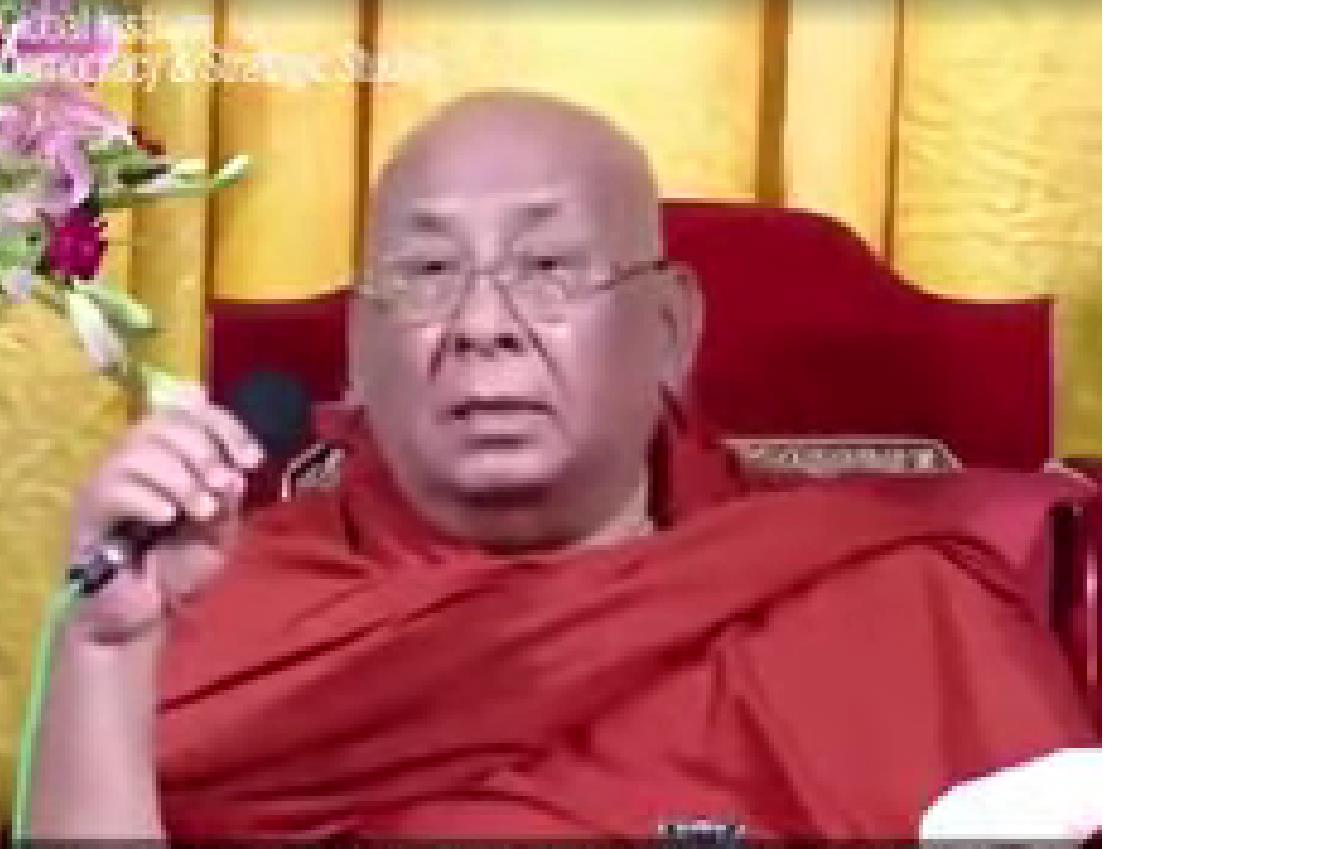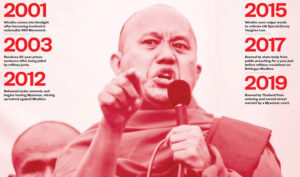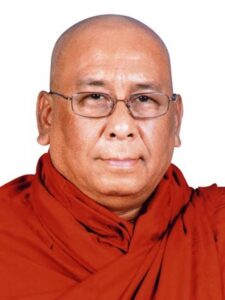Ashin Nyanissara (ဉာဏိဿရ; : Ñāṇissara) best known as Sitagu Sayadaw (သီတဂူဆရာတော်), is a Burmese meditation teacher and prolific Buddhist scholar. He is also the founder of Sitagu International Buddhist Academy.
Thidagu told Sr Gen Min Aung Hlaing not to be too lenient and give up the Rakhine problem. He stupidly remarked that the whole world may have taken the money of Muslims. Thidagu encouraged Sr Gen not to be afraid as there are four hundred thousand monks in Myanmar, if there is a problem he could easily incite or order them to rise-up.

Examining Thidagu Monk’s Controversial Remarks on Islam and the Rohingya
Date: September 30, 2016
In a recent address, Thidagu Sayadaw, a prominent Buddhist monk in Myanmar, made statements attributing the decline of Buddhism in regions such as Pakistan, Afghanistan, Bangladesh, and parts of Southeast Asia to the failure of monks, laypeople, and rulers to protect the faith. He cited examples like the transformation of Gandhara into Pakistan and Vanga into Bangladesh, suggesting that these areas, once Buddhist strongholds, have become predominantly Muslim due to negligence.
Thidagu further expressed concerns about the Rohingya Muslim population in Myanmar’s Rakhine State, particularly in Buthidaung and Maungdaw, implying that these regions are at risk of losing their Buddhist identity. Such remarks have been perceived by many as an attempt to incite anti-Muslim sentiments and justify discriminatory policies against the Rohingya community.
Historical Context and Rebuttals:
- Southern Thailand’s Religious History: Contrary to Thidagu’s claims, southern Thailand has historically been influenced by Hinduism and Islam, rather than Buddhism. The region’s cultural and religious landscape has been shaped by various factors, including trade and migration.
- Gandhara and Religious Transitions: The Gandhara region, encompassing parts of modern-day Pakistan and Afghanistan, experienced a rich tapestry of religious influences, including Buddhism, Hinduism, and later Islam. Religious transitions in this area were complex and cannot be solely attributed to the failure of Buddhist practitioners.
- Greek and Central Asian Regions: Areas like Greece, Turkey, and Uzbekistan have deep-rooted religious histories, primarily centered around ancient polytheistic beliefs, Christianity, and Islam. There is limited evidence to suggest that Buddhism had a significant presence or decline in these regions due to internal failures.
- Bangladesh’s Religious Evolution: Bangladesh’s religious landscape has evolved over centuries, influenced by various empires and cultural exchanges. While Buddhism was present, the region has also been a center for Hinduism and later Islam, reflecting a dynamic interplay of faiths rather than a singular narrative of decline.
Concerns Over Hate Speech:
Thidagu’s statements have raised alarms about the propagation of hate speech and its potential to exacerbate tensions in Myanmar. Similar rhetoric from other nationalist monks, such as Ashin Wirathu, has been linked to increased violence and discrimination against Muslim communities, particularly the Rohingya. Wirathu, often referred to as the “Buddhist Bin Laden,” has faced bans and criticism for his inflammatory speeches .theguardian.com+1en.wikipedia.org+1thedailystar.net
International Implications:
The international community has expressed deep concern over the treatment of the Rohingya in Myanmar. Reports from organizations like the United Nations have documented instances of violence, displacement, and human rights violations against the Rohingya population . There have been calls for accountability and investigations into potential acts of genocide and crimes against humanity.en.wikipedia.orgthedailystar.net
Conclusion:
While religious leaders play a crucial role in guiding their communities, it is imperative that their messages promote peace, inclusivity, and understanding. Statements that generalize or blame entire communities for historical or contemporary issues risk deepening divisions and inciting conflict. A nuanced understanding of history and a commitment to interfaith dialogue are essential for fostering harmony in diverse societies.
My late brother Maung Maung shared Myo Minn Oo’s post: (in Burmese)
According to Thidagu Sayadaw:
“As for the Rakhine issue, we can’t compromise.
Even if the global Muslim world pours in money, there’s nothing to be afraid of.
There are over 400,000 monks in Myanmar.
If needed, I’ll just say the word, and we’ll rise.
It’s easy.”
My FB friend Ko Kaung Kin Ko wrote in Burmese:
The world is a strange place.
I’ve seen a few friends — maybe two or three — who talk about sitting in meditation while enduring mosquito bites (as an act of compassion), yet later speak as if others — those of a different ethnicity or religion — should be killed.
I’m not trying to mock those people. But it makes me reflect deeply on human nature and the contradictions in our minds. Why can we offer metta (loving-kindness) to a mosquito, viewing it as part of our spiritual practice, but not extend that same compassion to fellow human beings?
Not only is there no metta, but there’s also even a desire to kill.
It made me think of Hitler — a man said to love animals, especially butterflies — and yet he was responsible for the murder of millions of Jews.
Why is it sometimes easier to show kindness to animals than to humans?
- (1) Perhaps because animals aren’t our rivals like humans can be.
- (2) Animals behave as we expect; they eat what we feed them, follow how we raise them.
- (3) Pets, in particular, remain under our control forever.
- (4) Animals pose no real threat to us — though insects like mosquitoes can carry disease.
- (5) Animals don’t talk back or criticize us.
- (6) We know animals can’t rebel against us.
This reflection poses a powerful question about the selective nature of our compassion — and how fear, control, and bias can distort it.
Related
MONKS THAT BRAINWASHED THE MILITARY to commit Atrocities and Genocide
Thidagu, Insein Ywar Ma Monk, Maw Kyun Monk and Mogoke Monkare going to hell
Dr. Ashin Vimalavamsa (of Phyarpone):
“Just goosebumps! Haha — these two are actually Buddhist heroes who dare to speak the TRUTH!”
As for Thidagu Sayadaw, the Chief Abbot (Pariyatti Sayadaw), the Tipitaka scholar monks, the Insein Village Abbot, the Mawgyun Tipitaka monk, and the famous preaching monk from Mogok — these two individuals have insulted all of them to a disgraceful extent. The question now is, what will the State Sangha Maha Nayaka Committee and the Ministry of Religious Affairs do about this? Let’s wait and see.
– Dr. Ashin Vimalavamsa (Nalanda University)
++ Those Who Incite Genocide ++
The real reason why genocide against Rohingya Muslims continues to happen in Myanmar is this:
One of the country’s top monks, Thidagu Sayadaw, once preached publicly that “it’s acceptable to kill those who are not Buddhists.” That sermon, which openly promotes religious violence, has now been shared in a video with English subtitles.
The video has been distributed internationally by the Global Institute for Democracy & Strategic Studies (GIDSS), a US-based organization.
Please note: This is being shared solely to reveal the truth — not to spread hate based on religion or ethnicity.
– Ko Richard Smith
“#Islam is the most dangerous faith, converting people via violence”.
“#Bengalis (i.e., #Myanmar‘s #Rohingya were like #African slaves, brought to build #USA)
Sitagu, Myanmar’s most powerful monk to US Commission of Freedom of Religion, 21/08/2014.








